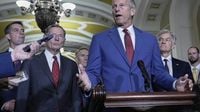The United States Senate took a dramatic step on September 18, 2025, confirming 48 of President Donald Trump’s nominees in a single sweeping vote—a move that has reignited long-simmering tensions over the chamber’s rules and the pace of government appointments. The confirmations, which included several high-profile diplomatic and executive branch positions, came after Senate Republicans deployed the so-called "nuclear option," changing the rules to allow multiple nominees to be approved en bloc with a simple majority vote. This unprecedented action was aimed at breaking a months-long stalemate as Democrats repeatedly delayed the president’s picks.
According to the Associated Press and other major outlets, the Senate voted 51-47, largely along party lines, to approve the four dozen nominees. Among those confirmed were Kimberly Guilfoyle as U.S. ambassador to Greece, Callista Gingrich as ambassador to Switzerland and Liechtenstein, Christine Toretti as ambassador to Sweden, and former GOP Representative Brandon Williams as under secretary for nuclear security. Jonathan Morrison, previously nominated as administrator of the National Highway Traffic Safety Administration, was also part of the group. The majority of the remaining nominees filled undersecretary or assistant secretary roles across a variety of federal agencies, including the Departments of Defense, Energy, and Interior.
All 48 nominees had previously received bipartisan support in committee votes, a fact repeatedly emphasized by Senate Majority Leader John Thune (R-S.D.) in his remarks on the Senate floor. “Republicans have fixed a broken process and restored the Senate precedent that applied to previous presidents — and that is allowing … a majority of a president’s nominees to be confirmed expeditiously,” Thune declared, as quoted by Nexstar Media Inc. and other sources. He added, “Today is the first slate of nominees. There will be more to come. And we’ll ensure that President Trump’s administration is filled at a pace that looks more like those of his predecessors.”
The rule change that made this mass confirmation possible was enacted just a week prior, after a protracted period of failed negotiations between the parties and mounting frustration among Republicans. For months, Democrats had used procedural tactics to force individual votes and lengthy debates on nearly every Trump nominee, which, according to CNN and the Associated Press, infuriated the president and tied up the Senate floor. The new rules allow for the confirmation of multiple lower-level, non-judicial nominees in a single vote—a process that previously could be blocked by just one senator’s objection. Notably, the changes do not apply to high-level Cabinet posts or judicial appointments, which must still be considered individually.
This latest move is part of a broader trend in the Senate, where both parties have gradually chipped away at longstanding rules in order to advance their agendas. The so-called "nuclear option"—a term coined to describe the dramatic alteration of Senate procedures—was first used by Democrats in 2012 under then-Majority Leader Harry Reid to lower the threshold for executive branch and lower court judicial nominations. Republicans, led by Mitch McConnell, later extended the simple majority rule to Supreme Court nominations in 2017 and further reduced debate time for most nominees in 2019. As Axios and POLITICO have noted, the current rule change is based in part on a proposal originally offered by Senators Amy Klobuchar (D-Minn.) and Angus King (I-Maine), though the Republican version imposes no cap on the number of nominees considered in each bloc.
While Republicans have hailed the rule change as a necessary fix to an "unsustainable" confirmation process, Democrats have voiced strong objections. Senate Democratic Leader Chuck Schumer argued that the new rules will allow unqualified nominees to escape proper scrutiny, warning Republicans that they may “come to regret” their actions. “What Republicans have done is chip away at the Senate even more, to give Donald Trump more power and to rubber stamp whomever he wants, whenever he wants them, no questions asked,” Schumer told the Associated Press. He further described Trump’s nominees as “historically bad,” echoing concerns raised by many in his party who see the move as an erosion of the Senate’s traditional role of advice and consent.
The GOP, for its part, contends that Democrats have abandoned the Senate’s longstanding practice of confirming lower-level nominees quickly by voice vote or unanimous consent. Instead, they say, Democrats have forced the chamber to spend hours on procedural votes for each nominee—an approach Republicans argue is less about oversight and more about stalling the Trump administration’s ability to govern. Thune, in his remarks, insisted, “We’re going to fix this today, and restore the longtime Senate precedent of expeditious confirmation, and the Senate’s role as first and foremost a legislative body.”
The political gamesmanship over nominations is nothing new. As Fox and other outlets observed, both parties have obstructed each other’s nominees when in the minority and have advocated for speeding up the process when in the majority. The current standoff is just the latest chapter in a saga stretching back more than a decade, with each escalation leading to further changes in Senate procedure. The stakes, however, feel especially high in the current climate, as both parties brace for a contentious 2026 election cycle and President Trump seeks to solidify his administration’s ranks after years of turnover and vacancies.
For now, the Senate’s new rules only apply to executive branch civilian nominees, excluding both Cabinet members and judicial appointments. But with roughly 125 additional Trump nominees still awaiting confirmation, Republicans have signaled that more en bloc votes are on the horizon. “There will be more to come,” Thune reiterated, suggesting that the Senate will continue to clear the backlog in the coming weeks.
Meanwhile, Democrats remain wary, arguing that the rapid-fire confirmations risk undermining the quality and accountability of government appointments. They point to the possibility that future majorities—regardless of party—could use the same tactics to push through controversial or unqualified nominees with minimal debate. Republicans counter that the process remains rigorous, noting that all nominees must still advance through committee and receive bipartisan support at that stage.
As the dust settles on this latest power play, the long-term consequences for the Senate’s institutional norms—and for the balance of power between the executive and legislative branches—remain uncertain. What is clear is that the battle over nominations is far from over, and the rules of the game are still very much in flux.
With more votes expected soon, the Senate’s experiment with en bloc confirmations is set to continue shaping the contours of American governance, for better or worse.





